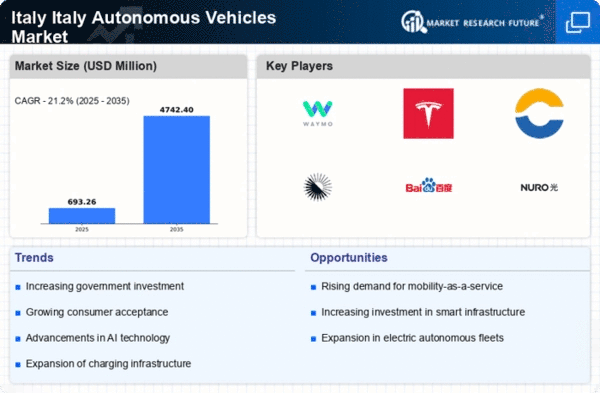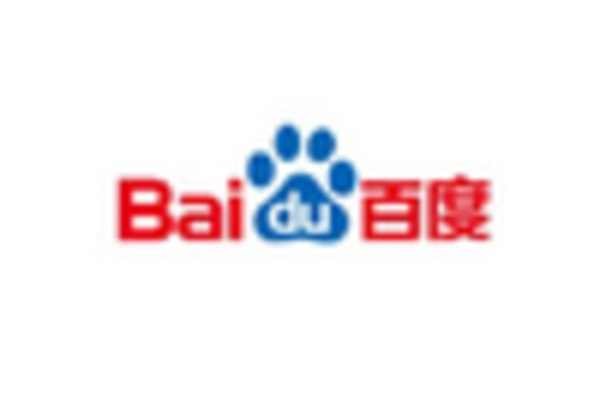Infrastructure Development
The advancement of infrastructure is a critical driver for the autonomous vehicles market in Italy. The government is investing heavily in modernizing road networks and integrating smart technologies to facilitate the deployment of autonomous vehicles. By 2025, it is projected that over 30% of Italian roads will be equipped with smart traffic management systems, which are essential for the safe operation of autonomous vehicles. These systems include vehicle-to-infrastructure communication, real-time traffic monitoring, and adaptive traffic signals. Such developments not only improve traffic flow but also enhance safety, making the roads more suitable for autonomous operations. Additionally, the expansion of electric vehicle charging stations is vital, as many autonomous vehicles are electric. This infrastructure development is expected to create a more favorable environment for the autonomous vehicles market, encouraging both manufacturers and consumers to embrace this technology.
Government Initiatives and Funding
The Italian government actively promotes the development of the autonomous vehicles market through various initiatives and funding programs. These efforts include financial incentives for research and development, as well as subsidies for companies investing in autonomous technologies. In 2025, the government allocated approximately €200 million to support projects aimed at enhancing road safety and reducing traffic congestion through automation. This funding is expected to stimulate innovation and attract investments, thereby accelerating the growth of the autonomous vehicles market. Furthermore, the establishment of testing zones in urban areas allows companies to pilot their technologies in real-world conditions, fostering collaboration between public and private sectors. Such initiatives are crucial for creating a conducive environment for the autonomous vehicles market, as they not only enhance technological advancements but also ensure regulatory compliance and public safety.
Consumer Demand for Safety and Convenience
There is a growing consumer demand for enhanced safety and convenience in transportation, which significantly impacts the autonomous vehicles market in Italy. Recent surveys indicate that approximately 70% of Italian consumers express interest in autonomous driving features, citing safety improvements and reduced travel stress as primary motivations. This demand is driven by increasing awareness of road safety statistics, where autonomous vehicles are perceived to potentially reduce accidents caused by human error. Furthermore, the convenience of autonomous vehicles, such as the ability to work or relax during commutes, appeals to busy urban dwellers. As consumer preferences shift towards safer and more convenient transportation options, manufacturers are likely to invest more in developing autonomous technologies. This trend suggests a robust growth trajectory for the autonomous vehicles market, as companies strive to meet the evolving expectations of consumers.
Technological Advancements in AI and Sensors
Technological advancements in artificial intelligence (AI) and sensor technologies are pivotal for the evolution of the autonomous vehicles market in Italy. Innovations in machine learning algorithms and sensor capabilities enhance the ability of vehicles to navigate complex environments safely. By 2025, it is anticipated that the accuracy of sensor systems will improve by over 40%, enabling better detection of obstacles and pedestrians. This progress is crucial for ensuring the reliability and safety of autonomous vehicles, which is a primary concern for both manufacturers and consumers. Additionally, advancements in AI facilitate real-time decision-making, allowing vehicles to respond effectively to dynamic road conditions. As these technologies continue to evolve, they are likely to drive down costs and improve the performance of autonomous vehicles, thereby fostering greater adoption within the market.
Partnerships and Collaborations among Stakeholders
Partnerships and collaborations among various stakeholders are emerging as a significant driver for the autonomous vehicles market in Italy. Automotive manufacturers, technology companies, and research institutions are increasingly joining forces to accelerate the development and deployment of autonomous technologies. These collaborations often lead to shared resources, knowledge exchange, and reduced development costs. For instance, a notable partnership between an Italian automotive firm and a tech startup focuses on integrating advanced AI systems into vehicles. Such alliances not only enhance innovation but also facilitate compliance with regulatory standards, which is crucial for market entry. As stakeholders work together to address challenges and leverage opportunities, the autonomous vehicles market is likely to experience accelerated growth, driven by a collective effort to advance technology and improve safety.















